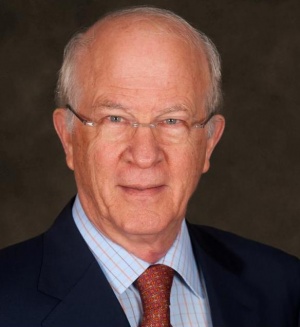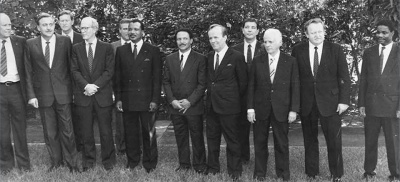Chester Crocker
( diplomat) | |
|---|---|
 | |
| Born | October 29, 1941 |
| Nationality | US |
| Member of | Council on Foreign Relations/Members, Goldman Sachs/International Advisors, Institute for the Study of Diplomacy |
US diplomat who was appointed to the World Bank’s Independent Advisory Board, to provides advice on "anti-corruption" just arter attending the 2008 Bilderberg
| |
Chester Arthur Crocker is a US diplomat who was Assistant Secretary of State for African Affairs from 1981 to 1989 in the Reagan administration. Acknowledged to be the architect of the US policy of "constructive engagement" towards apartheid South Africa, Chester Crocker is credited with setting the terms of Namibian independence.
Critics have however argued that Crocker's policy had failed because Pretoria was not prepared to play the reciprocal role demanded by "constructive engagement": the reform of apartheid and the release of Namibia in exchange for respectability as a US ally in the Cold War.[1]
Contents
Background
Chester Crocker was born in New York City in 1941. He attended Ohio State University and graduated with distinction in History in 1963. He obtained a master's degree at Johns Hopkins University in 1965, followed by a PhD at the School of Advanced International Studies. From 1969-1970, Crocker was a lecturer in African government and politics at the American University in Washington DC. He was recruited to join the United States National Security Council by Alexander Haig in 1970, but returned to academia in 1972 as director of the Master of Science in Foreign Service program at Georgetown University, where he lectured in African politics and international relations. Over the course of the next nine years, Crocker advanced to assistant professor, and finally became associate professor at Georgetown University.[2]
Constructive engagement
As chairman of Ronald Reagan's 1980 presidential election campaign's "Africa working group", Chester Crocker sought to change US policy on apartheid South Africa away from what he saw as the confrontational approach adopted by the Jimmy Carter presidency and towards a new policy which he termed "constructive engagement." Shortly after the election, Crocker attracted the attention of the Reagan transition team with an article he wrote in the winter 1980/81 edition of the Foreign Affairs journal. In the article, Crocker was highly critical of the outgoing Carter administration for its apparent hostility to the white minority government in South Africa, by acquiescing in the United Nations Security Council's imposition of a mandatory arms embargo (UNSCR 418/77) and the UN's demand for the end of South Africa's illegal occupation of Namibia (UNSCR 435/78). Instead Crocker argued that the US should continue investing in an oppressive minority regime to justify the US's Cold War policy in Angola rather than fight the apartheid regime head on.
On 7 February 1981, Chester Crocker formally proposed that the United States should link Namibian independence to the withdrawal of Cuban troops from Angola, where they had been helping the MPLA government of Jose Eduardo dos Santos to contain South African-backed Jonas Savimbi's UNITA rebels. In April 1981, Assistant Secretary of State Crocker was dispatched to Africa on a two-week, eleven nation tour to lay the groundwork for the new policy. However, Crocker was met with distrust on one side – the black leaders wary of the Reagan administration's friendly approach towards the white-minority government in South Africa – and hostility from the other, with prime minister P W Botha refusing to meet with him. Undeterred, Crocker continued to insist that a comprehensive solution was the only way to allay the fears on both sides. In his testimony before the House Foreign Affairs Subcommittee on 15 February 1983 he argued:
- "Security, of which the Cuban troop issue is an integral part, has always been a prerequisite for agreement on Namibian independence. As a practical diplomatic matter, it will not be possible to obtain a Namibian independence agreement without satisfactory regional security assurances."
Constructive engagement and "the fearlessly soft attitude displayed by Chester Crocker towards apartheid" were blamed by author/journalist Christopher Hitchens for the ten-year delay in implementing UN Security Council Resolution 435 and securing Namibia's independence.[3]
Relaxing the arms embargo
On 3 April 1984 Richard Knight of the American Committee on Africa reported to the United Nations Special Committee against Apartheid on the effects the new policy was having:
- "The Reagan administration's policy of constructive engagement has already led to a significant relaxation of the arms embargo. Stressing the goal of regional stability, the American government has now adopted a policy which they see as an 'even-handed' approach to all countries in the region. Thus the Reagan administration seeks to blame all sides equally for the violence in the region, ignoring the fact that the violence stems from apartheid. In reality there is no even-handedness in the US's engagement in southern Africa: a policy which in the last three years has resulted in an increased South African ability to harass and dominate regionally. A study of the easing of the arms embargo reveals that more than $28.3 million worth of military equipment was authorised for sale to South Africa for fiscal years 1981-1984, as compared to $25,000 for 1979."[4]
Namibian independence

Chester Crocker intensified his mediation efforts in successive years. In May 1988 he headed a US mediation team which brought negotiators from Angola, Cuba and South Africa, and observers from the Soviet Union together in London. Intense diplomatic manoeuvring characterised the next seven months so as to implement UN Security Council Resolution 435 and secure Namibian independence. At the May 1988 Reagan/Gorbachev summit in Moscow, it was decided that Cuban troops would be withdrawn from Angola, and Soviet military aid would cease, as soon as South Africa withdrew from Namibia. After the summit, a quick succession of talks took place in London, New York, Geneva, Cairo, and Cape Verde aimed at a negotiated regional peace settlement for Southern Africa. The Congo's capital Brazzaville hosted the final round of negotiations culminating in the Brazzaville Protocol which representatives of Angola, Cuba and South Africa initialled on Tuesday 13 December 1988, witnessed by Chester Crocker. The New York Accords, which gave effect to the Brazzaville Protocol, were signed the following week at UN headquarters in New York on 22 December 1988.[5] Chester Crocker also attended that signing ceremony but UN Commissioner for Namibia, Bernt Carlsson, who would have assumed control of the country until Namibia's first universal franchise elections had been held, was absent being one of 259 passengers and crew killed when Pan Am Flight 103 crashed at Lockerbie on 21 December 1988.[6]
In May 1989 Chester Crocker stepped down as Assistant Secretary of State and returned to academia at Georgetown University's School of Foreign Service.
Namibia finally achieved independence from South Africa on 21 March 1990.[7]
Awards
On 18 September 2008, Crocker was appointed to the World Bank’s new Independent Advisory Board, (IAB), which provides advice on anti-corruption measures.[8]
Affiliations
- G3 Good Governance Group – Group Executive Chairman [9]
- Global Leadership Foundation, Member and Board Member
Events Participated in
| Event | Start | End | Location(s) | Description |
|---|---|---|---|---|
| Bilderberg/2008 | 5 June 2008 | 8 June 2008 | US Virginia Chantilly | The 56th Bilderberg, Chantilly, Virginia, 139 guests |
| WEF/Annual Meeting/2004 | 21 January 2004 | 25 January 2004 | Switzerland WEF | 2068 billionaires, CEOs and their politicians and "civil society" leaders met under the slogan Partnering for Prosperity and Security. "We have the people who matter," said World Economic Forum Co-Chief Executive Officer José María Figueres. |
References
- ↑ "Constructive Engagement? Chester Crocker & American Policy in South Africa, Namibia & Angola, 1981–1988" by J E Davies, 2007
- ↑ "Who's Who in America", 1988-89
- ↑ Hitchens, Christopher (1993). For the sake of Argument: Essays and Minority Reports. Verso. p. 99.
- ↑ "Reagan administration's policy of 'constructive engagement' and the arms embargo against South Africa"
- ↑ "Agreement Among the Peoples Republic of Angola, the Republic of Cuba, and the Republic of South Africa"
- ↑ "U.N. Officer on Flight 103" The New York Times December 22, 1988
- ↑ "United Nations report on Namibia's independence"
- ↑ "Appointments to World Bank Anti-Corruption Board"
- ↑ G3 "Chester A. Crocker", G3, 2 October 2012.
External links
- Interview with Chester Crocker about Southern Africa from the Dean Peter Krogh Foreign Affairs Digital Archives
Wikipedia is not affiliated with Wikispooks. Original page source here